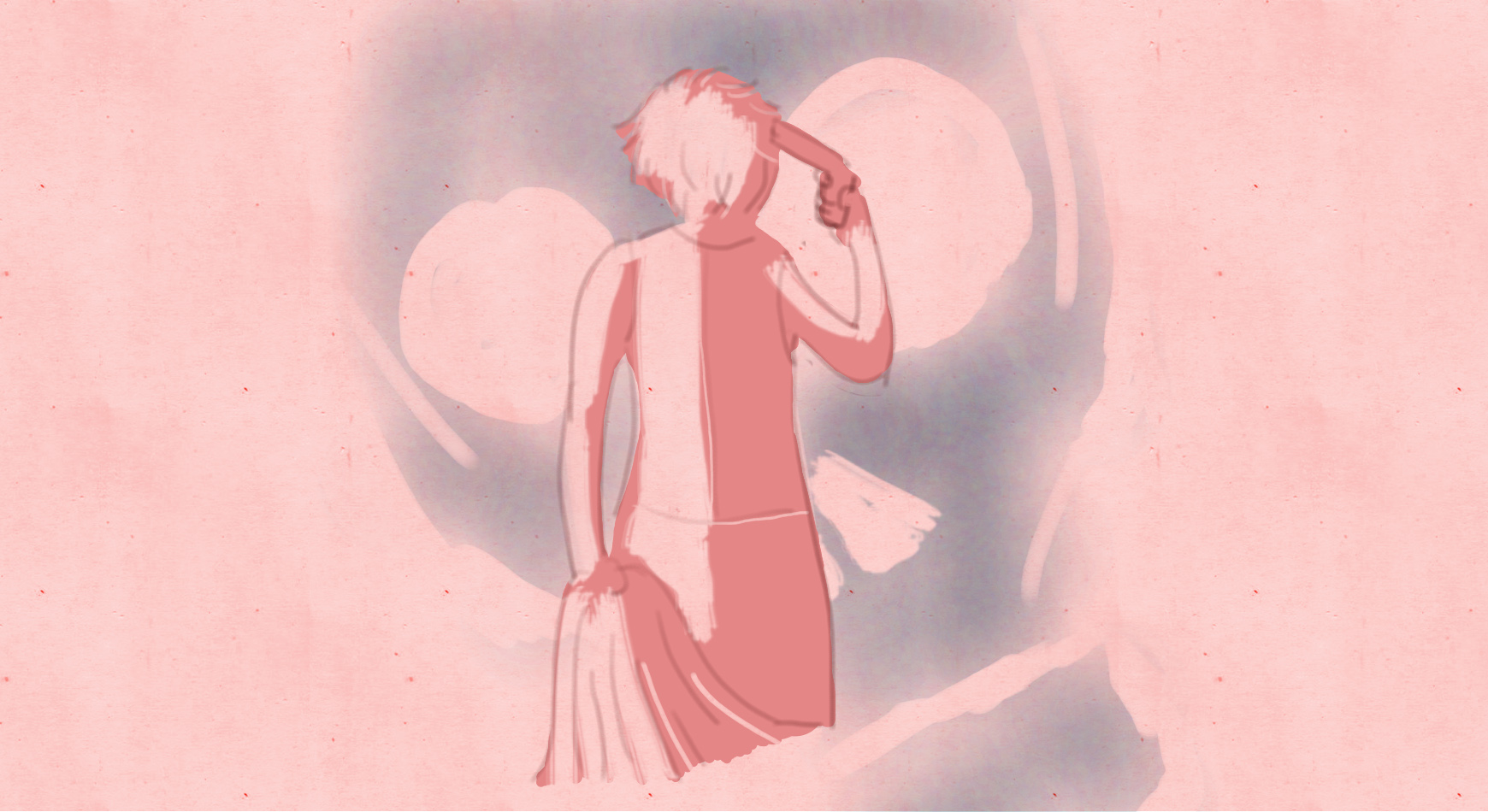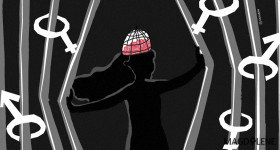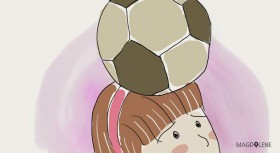She was beautiful, posing bashfully like a teenage girl would. Wearing a dress, she seemed completely at home as she took a shot of her reflection on her phone.
Staring straight at the mirror, she appeared a bit unsure, as if she was hiding something. This pretty girl's selfies could have been easily lost in the millions of pubescent selfies published daily in Tumblrs and social media walls worldwide. But this girl's particular set of photos was destined to become a wake-up call to the reality of sadness in young queer lives.
Before Leelah Alcorn jumped in front of a speeding truck to end her life, she wrote a suicide letter on her Tumblr and scheduled it to be published after her death. In her letter, she blamed her parents for teaching her to hate herself, for the rounds of Christian "conversion" therapy her parents forced her to go through, and for her depression and self-hate.
After her death, her parents maintained that they accepted their "son," and did not mean "him" harm. LGBT advocate and writer Dan Savage believes that Leelah's own parents' disapproval threw her in front of that truck and that they should be prosecuted. Transgender celebrities like Laverne Cox, Janet Mock, and Andreja Pejic expressed their sadness about Leelah and their rage about the growing suicide rate among transgender teens.
Nearly half try to end their lives
In the US, 48 percent of transgender youth will attempt suicide at least once in their lives. Lesbian, gay, and bisexual youth are four times more likely to attempt suicide than their straight counterparts. There are no known numbers for LGBT suicides in the Philippines, but it's fair to say that even a single death should matter, especially if that child is someone you know.
We all know people who chose to end their lives. I am contacted by at least one suicidal LGBT person every month, and one day one of them will succeed and leave a note. I'm hoping it won't be your child.
The US CDC reports that 19-29 percent of gay and lesbian students have experienced dating violence, and 14 percent to 31 percent of gay and lesbian students will be forced to have sex at least once in their lives. These assaults remain largely unreported, as teens are afraid of approaching their parents and guardians. Especially in the Philippines where the adults in homes of LGBT youth might be the first to disapprove, statistics for assault against LGBT youth will be grossly underreported.
Philippine numbers
You might argue that Leelah Alcorn is American and the culture there is different from the Philippines', but there are thousands of transgender youth in the Philippines, and even more lesbians, gays, and bisexuals who are also suffering the same amount of bullying, assault, abuse and non-acceptance at home.
It is reported that 1 of 10 Filipino gay youth have been assaulted in their own homes, a number that is definitely higher when we take into account that the majority of these cases remain unreported.
Filipino LGBT teens have been burned with boiling water, beaten or disowned by their own parents and guardians. These are just some of the cases that are actually reported.
There aren't a lot of available numbers in the Philippines, but other Asian countries have been keeping track. In Japan, 70 percent of LGBT youth have experienced bullying in school, and 30 percent have considered suicide and self-harm.
The Philippine LGBT Hate Crime Watch counted 144 deaths from hate crimes against LGBT Filipinos from 1996 through 2011 (again, a number affected by underreporting). According to USAID's Being LGBT in Asia: The Philippines Report, many guardians of Filipino LGBT youth fail to protect them and are even the ones who abuse them. Acts of discrimination and assault are also rarely reported outside the home.
Coupled with the increased likelihood of suicide, violence, and sexual abuse against queer Filipinos, it is fair to say that our LGBT youth are at risk of death, injury, and self-harm. With no one to turn to when their families become the first to reject or abuse them, they become more likely to engage in dangerous behavior and substance abuse. They become victims of sexual abuse and hate crimes, or suffer depression and commit suicide.
Another transgender person's death
Leelah Alcorn is dead now, and soon she will be forgotten. Her suicide note expressed her desperation at her situation and her hopelessness that she would have a better life one day. You may feel that this incident is far from you, or that it's the exception rather than the rule. However, transgender men and women are all around you, and if you took the time to ask them about their lives you might learn about the violence and abuse they face daily.
Ask your nearest transgender woman how her father treated her when she was young. Ask your closest gay or lesbian friend if they've ever considered suicide. Ask yourself how you would feel if Leelah Alcorn was you, or if she was your child.
You may or may not care, but if you have a gay, lesbian, bisexual or transgender child; if you are a parent, or are planning to have children one day, imagine this:
You are burying your child who spent a lifetime being bullied by his friends, or was asked to change by his own family. You are in the funeral procession for your son who was murdered because he was gay. You are in the front row at the wake for your daughter, who jumped off a building or hung herself because you told her that there is no way you or God will accept who she is or who she loves.
You stare at her lifeless body through the glass, wearing a dress you chose but one she'll never appreciate. You've placed a necklace on your son's neck (or a bracelet on your daughter's wrist) that he or she will never see. It is the last time you'd be able to touch your child, now cold and stiff inside a box.
When your child was living and breathing, it was so difficult for you to accept him as he was. You could not approve of the callings of his heart. You promised you would never accept her. You commanded him to pray it all away because it was just too hard to let him be who he was about to become. You called your opposition to his wishes parental love and concern. You called it "wanting the best for your child."
Your son left home and ran off with a bad crowd. Your daughter starting cutting herself at night to numb herself from the self-hate you instilled in her. Your son decided that the acceptance of strangers or the high given by drugs was better than the rejection from his own parents or their unhappiness about his life. Or they just quietly accepted your disapproval, seething in their own sadness behind your back.
Eventually, they just gave up. Their lives were taken too soon – either by their own hands or by someone else's – when you know very well you could have protected them. You know very well that as a parent, saving your child's life was your only job.
A simple choice
Let me ask you then, which seems harder now? Accepting your own child as he or she is, or throwing the first handful of dirt onto a coffin containing the corpse of your baby being lowered to the ground?
It might be time to give your child a hug and be thankful for whatever life he or she has, regardless of your own ideas of the person you want him or her to become. Even if you don't know what steps to take or where to proceed or what to say, at least let them know you do not ever want to lose them, and that you are the one person they can turn to if they need help.
Before gaining society's approval, before abiding by someone else's teachings about your God of love, your greatest obligation has always been to love and accept your child. Start doing your job.
"I want my death to mean something," were Leelah Alcorn's last words before she signed off and took the last walk of her 17-year short life.
The number of LGBT deaths due to suicide or hate crimes may just be a number to you until one of them is your friend, colleague, or child. Just like with Leelah's parents, you'll never know that any moment could be the last chance you get to say you love and accept your own brother, sister, daughter or son. Make every moment with them one you won't regret – in case it's the last time.
Follow #LeelahAlcorn and #RealLiveTransAdult on Twitter to learn more about Leelah Alcorn, transgender youth suicide, and transgender people's success stories.
This story was first published in Rappler.com, a Manila-based social news network where stories inspire community engagement and digitally fuelled actions for social change.







Comments